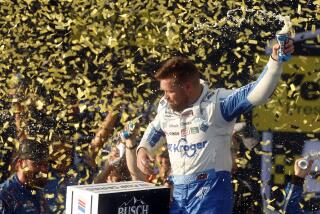Ballad Stuffing
In “Talladega Nights: The Ballad of Ricky Bobby,” Sacha Baron Cohen plays the lightest heavy in movie history--a wet-lipped and openly gay French racing driver from “Fohr-moolla Une” who drives with Perrier sponsorship. This, in NASCAR
Nation, is how you get the perfect comic villain: French, gay, mineral water.
Tres ridicule? Incroyable? Peut-etre. In a delightful example of fiction being drafted on the backstretch by fact, the same week that “Talladega Nights” was in previews, word came that Juan Pablo Montoya, the biggest brat in the Formula One paddock, will be leaving the premier open-wheel series and the storied McLaren team to run tintops with them boys in the NASCAR Nextel Cup. Of course, Montoya is Colombian and heterosexual--like Ricky Bobby, Montoya has a smokin’ hot wife, Connie--but you could not ask for a better example of the sport’s marching cosmopolitanism than the obscenely overcompensated, multilingual, finicky Montoya. Talk about the anti-Bubba.
Well, at least the cars in NASCAR are American . . . oh, wait, Toyota is entering the Nextel Cup series next year, after serving an apprenticeship of several years in the Craftsman Truck series. Yeah, but it’s still a Southern sport . . . oh, right. After the sport’s “realignment” of the 2004 season, races were taken away from historic venues such as Rockingham Speedway in North Carolina and Darlington in South Carolina and moved to--ugh--major media markets like Phoenix and Los Angeles. Yeah, but it’s the last truly American sport. That is, if you don’t count the satellite offices in Canada and Mexico that NASCAR opened in the past few years to “grow” the brand and the stock price. There’s already a minor-league Busch Series race in Mexico City, and it’s only a matter of time before the Nextel Cup schedule includes races north and south of the borders.
Sure, but with 3,400-pound cars whistling around at 200 mph, NASCAR drivers are men’s men. Except if and when open-wheel phenomenon Danica Patrick, the young woman who threatened to win this year’s Indy 500, makes her widely anticipated move to NASCAR.
Yeah, well, at a minimum, Patrick is white, and NASCAR is still a whites-only club. Perhaps for now, but not for want of trying. NASCAR is desperately trying to place African Americans and Hispanics (and no, Montoya does not qualify) in drivers’ seats, with a high-profile program chaired by NBA Hall-of-Famer Magic Johnson. You may, of course, take this program as evidence of Daytona Beach’s heretofore underappreciated commitment to the advancement of civil rights. Or you may take it for what it is: diversity marketing.
As a North Carolina native and lifetime fan, I find NASCAR’s drive to be the all-sheltering big tent of major-league sports a luscious irony. It also models a mode of thinking that could be very useful in these fractious times. For all those Americans guarding the borders--in spirit if not in practice--try not to think of illegal immigrants as invaders. Think of them as new consumers.
The irony of “Talladega Nights” is that the world it strains so hard to parody--the deep-fried Southern, baby Jesus-loving, xenophobic cracker-dom of NASCAR--is utterly a relic of a previous age. The sport--run by the ironically named France family in Daytona Beach--has abandoned its traditional fan base, with its traditional prejudices, in order to become what it is today: a titanic, broad-spectrum, multibillion-dollar international sports franchise with an eye toward becoming World Cup soccer with wheels. Diversified, corporatized, liberalized, heavily monetized, NASCAR’s huge left turn is complete. NASCAR has gone Hollywood.
For anyone who has held a media hard-card from NASCAR, the cooperation the organization gave to the “Talladega Nights” filmmakers is nothing short of astonishing (by the way, there is no nighttime racing at Talladega, so the title is pure euphony). The crew was allowed to shoot in the pits and garages during races, and NASCAR vetted nearly every detail of the script, from the look of the cars to the fictional sponsors.
Not everyone thought such cooperation was a good idea. One Nextel Cup team reportedly declined to be in the movie after seeing the script, saying the movie would set back the sport’s image 25 years.
But in a sense, that’s just what NASCAR wanted. “Talladega Nights,” as well as the animated feature “Cars” earlier this year, lightly mocks the sport as it would have itself perceived--as the same red and rooty pastime it’s always been, simple and tradition-bound, uncorrupted by the New York Stock Exchange or Hollywood media slickness. It’s just a bunch of good old boys racing roundy-round. Thank God and Goodyear.
Except it’s not. NASCAR is a highly sophisticated, endlessly ambitious and deeply cynical merchandising machine, and with “Talladega Nights,” NASCAR has joined forces with a like-minded creature. There is nothing Hollywood can teach NASCAR about, say, product placement, and vice versa. Two mighty tornadoes have collided to form a super vortex of empty entertainment. It’s just like a redneck divorce: Somehow, somebody’s going to lose their trailer.
More to Read
Go beyond the scoreboard
Get the latest on L.A.'s teams in the daily Sports Report newsletter.
You may occasionally receive promotional content from the Los Angeles Times.










